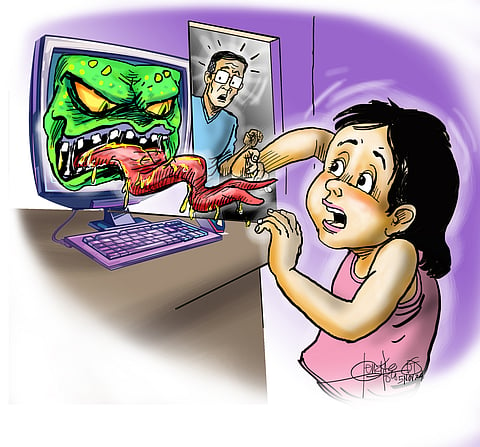
- NEWS
- the EDIT
- COMMENTARY
- BUSINESS
- LIFE
- SHOW
- ACTION
- GLOBAL GOALS
- SNAPS
- DYARYO TIRADA
- MORE

It’s a perverse twist of the digital age: A French man, ensconced in the comfort of his home, orchestrates the rape of Filipino children half a world away. Bouhalem Bouchiba, a former Pixar and Disney animator, was recently sentenced to 25 years in prison for his role in this horrific crime. But his conviction, while a victory of sorts, lays bare the depths of depravity and the systemic failures that have allowed such atrocities to flourish.
Alas, the Philippines, a nation known for its warmth and hospitality, has become a stomping ground for the Online Sexual Abuse or Exploitation of Children (OSAEC). The poverty and desperation of many Filipino families in the countryside and urban slums have apparently made them vulnerable to exploitation by international pedophiles. The government’s tepid response to this crisis is a national disgrace.
It’s as if we’re living in a grotesque horror film, where the victims are innocent children and the villains are lurking in the shadows of the internet. The complicity of some parents, driven by poverty and desperation, adds a layer of tragic irony to this sordid affair. It’s a stark reminder that even in the darkest corners of the world, there are people who would exploit the most vulnerable for their own twisted pleasure.
The Philippine government’s response to the OSAEC crisis has been as feeble as a wet noodle. While there have been some efforts to strengthen law enforcement and victim support services, these measures are mere lip service. The real question is: Why has it taken so long for the government to wake up to this crisis? Why is it that a foreign court had to step in to deliver justice?
The Philippines should not be a haven for pedophiles. It’s time for the government to get its act together and take decisive action to protect our children. This is not just a moral imperative; it’s a matter of national survival. We must demand accountability from our leaders. We must demand that they prioritize the protection of our children over political expediency.
At the very least, our government must invest in specialized units to investigate and prosecute OSAEC cases, equipping them with the latest technology and training to effectively combat cybercrime. Close collaboration between law enforcement agencies and internet service providers is, likewise, crucial to identify and apprehend perpetrators.
Providing comprehensive care to victims, including psychological counseling, medical treatment and economic assistance, is also essential. Victims often suffer from long-lasting trauma and require specialized care to recover. Thus, establishing dedicated support centers and ensuring access to mental health services are crucial steps in providing comprehensive support.
At the same time, widespread public awareness campaigns should be conducted through various channels, including television, radio, social media,and educational institutions. These campaigns should highlight the signs of exploitation, the legal consequences of engaging in such activities and the importance of reporting suspected cases.
The Philippines should collaborate deeply with other countries to dismantle transnational child exploitation networks, sharing intelligence, best practices and resources. Joint investigations and coordinated law enforcement efforts can be effective in disrupting these networks and bringing the perpetrators to justice.
Empowering children and young people to recognize and avoid online risks is a must. Digital literacy programs should be integrated into the school curriculum and focus on teaching children about online safety, the responsible use of technology and critical thinking skills.
By equipping children with the knowledge and skills to protect themselves online, we can significantly reduce the risk of exploitation. For politicians and government leaders, the time for empty promises and half-hearted measures is over. The nation demands justice for its children.
